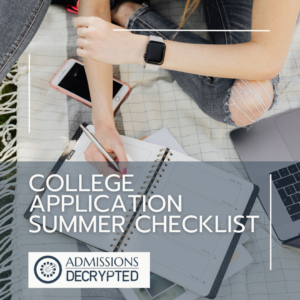If you’re finishing junior year, use the summer to get a head start on college applications. With steady work over the next few months, you could be ready to submit applications shortly after they open in August, well before early application deadlines.
Here’s what to work on before school ends and during the summer.

Before the End of the School Year
Understand How Your School Processes Transcripts and Recommendations
Check your counseling center’s website for details. There may be a webinar or slide deck explaining how your school sends college application materials. Note any internal school deadlines. Many schools require a few weeks’ notice to send documents and you don’t want a late request to cause you to miss a deadline.
If your school uses software like Naviance or Scoir, you may need to submit requests through that system.
If you plan to submit some applications before the beginning of the new school year, such as for low capacity professional aviation programs or rolling applications outside Common App, you should approach your counselor to ask how best to handle this. Many high schools send transcripts out after senior schedules have been corrected in the fall, so meeting a July or August deadline is an exception that requires advance coordination.
Ask Teachers for Letters of Recommendation
Some colleges require or consider teacher recommendations. Requesting these before summer gives teachers more time to write, and popular teachers often have a limit to how many letters they’ll write.
Choose a teacher who knows you well. Ideally this would be a teacher of a core subject related to your intended major. An elective teacher could be another strong choice if they can write about your strengths as a student and as a person.
Help teachers write a strong letter by sharing a brief “brag sheet” that highlights your contributions and achievements. And thank them for their time; writing strong, thoughtful letters of takes time outside of their normal classroom duties.
Note for Military Program Applicants: Military service academy, ROTC scholarships, and nominations applications have separate application portals and recommendation requirements. They may require evaluations from specific teachers, like a junior-year math teacher, and letters may need to be uploaded to multiple portals. Check the requirements carefully and communicate clearly with your teachers.
Related: Guide to Military Academy Nominations
Plan for Standardized Testing
If you’re planning to submit ACT or SAT scores, check the available test dates now. Fall dates are limited, and seats can fill up quickly.
Ideally, you should complete your testing by September so you have time to review and send scores by early application deadlines. Military service academies and scholarships may accept later test scores, but earlier is usually better for your overall timeline.
Related: Do Test Scores Still Matter for College Admissions?
Download an Unofficial Transcript
You’ll need your transcript to complete the Education section of Common App and to self-report courses and grades to colleges that use the SRAR (Self Reported Academic Record).
Most high schools provide unofficial transcripts through student portals. Ask how to access this before school lets out.
During the Summer
Write Your Main Essays
Summer is the best time to work on your Common App Personal Statement, the University of California Personal Insight Questions, and military program essays.
Read the prompt carefully and answer it fully. Remember that the purpose of these essays is to tell who you are outside of the courses, grades, and test scores that are already in your application.
Clear and effective writing takes time. Brainstorm, write a rough draft, and revise thoughtfully. Reading your draft out loud will help you catch mistakes you might otherwise skim over. Write outside the application, and check your spelling and grammar before copying your essay into the application.
Related: How to Write a “Why Us?” College Essay
Create Your Common Application Account
Get a head start on your application by creating a Common Application account and filling out the personal information sections:
- Profile
- Family
- Education
- Activities.
- Testing (if submitting scores)
You can add colleges to the My Colleges section, but wait to fill out the college specific questions until the new application cycle launches on August 1.
Use a personal email address, not a school email, since school email systems sometimes block emails from outside addresses – like colleges!
Common App will freeze accounts at the end of July and “rollover” to the new application on August 1. Unless you’re applying to a program with very early deadlines, wait a few days to allow the system to resolve any bugs.
Talk with Your Family About College Costs
This is one of the most important tasks (though it might be awkward or uncomfortable at first). It’s better to have these conversations now than when you have offers of admission to colleges your family cannot afford.
Ask your parents to run the Net Price Calculators for every college you want to apply to. These tools give your family an estimate of how much each college would cost a student like you and how much financial aid you might receive. Pay attention to whether aid is in the form of grants, work study, or loans (or some of each).
Keep in mind:
- Colleges are the biggest source of financial aid
- Federal aid is based on formulas and may be limited to loans
- Outside scholarship are competitive and may offer small amounts
- Dependent students can only borrow a limited amount each year.
- Net Price Calculators only show one year’s cost, not the full 4-6 years for a degree.
Don’t assume your family can “make it work” for a college with an annual cost of $60,000-90,000. Make sure your college list includes options that are a good fit, are likely to admit you, and are financially affordable.
Related: College Costs and Financial Aid
Share